Get to Know the Power and Reliability of the 2.2 Ford Ranger Engine for Any Job
Get to Know the Power and Reliability of the 2.2 Ford Ranger Engine for Any Job
Blog Article
How to Choose the Right Auto Engine for Maximum Performance and Effectiveness
Picking the suitable automobile engine to achieve an ideal balance of efficiency and performance requires a nuanced understanding of various engine kinds and their details attributes. Elements such as engine variation, the number of cylinders, and gas type play a pivotal role in identifying both power result and gas economic situation. While some may lean in the direction of performance-driven options, others could prioritize sustainability and performance. Understanding these characteristics is crucial; nevertheless, the obstacle lies in straightening these qualities with your specific driving requirements and choices. What considerations will eventually lead your decision?
Recognizing Engine Types
When choosing a vehicle, among the most crucial elements to think about is the engine kind, which serves as the heart of the vehicle. The engine type dramatically affects the auto's general performance, durability, and viability for your driving needs. There are mostly 3 engine kinds to consider: interior burning engines (ICE), hybrid engines, and electrical engines.
Inner burning engines stay one of the most usual, operating gasoline or diesel. They are recognized for their power and acceleration, making them suitable for performance-oriented cars. They might drop short in gas performance and ecological influence.
Crossbreed engines combine an interior burning engine with an electrical motor, using an equilibrium in between efficiency and fuel economic situation. They are significantly popular for drivers looking for minimized exhausts while still providing sufficient power.
Electric engines, powered entirely by batteries, are acquiring grip because of their environmental benefits and lower running prices. They give immediate torque and a peaceful driving experience, making them excellent for city commuting.

Efficiency vs. Effectiveness
Picking the best engine kind entails considering the trade-offs in between efficiency and performance. Efficiency usually refers to just how well an engine can provide power and acceleration, which is often connected with bigger variation engines or those with turbocharging capabilities. These engines commonly offer electrifying driving experiences and quick feedback times, making them prominent amongst enthusiasts.
On the other hand, performance concentrates on fuel economic situation and lower discharges. Smaller sized engines, specifically those geared up with innovative technologies such as straight gas injection and variable valve timing, tend to supply better miles per gallon and decreased carbon impacts. While these engines might compromise some power contrasted to their bigger counterparts, they usually succeed in day-to-day driving situations where high efficiency is not constantly required.
Ultimately, the choice between performance and performance depend upon private concerns. A vehicle driver who values perky driving might prioritize a high-performance engine, while somebody looking for economical commuting may lean toward an efficient choice. Recognizing these compromises is essential for making an informed decision that straightens with your driving needs and lifestyle, ensuring that the selected engine kind matches your expectations for both efficiency and effectiveness.
Trick Specs to Think About
Comprehending vital specs is vital for making an educated decision concerning the appropriate auto engine. When picking an engine, several critical elements require consideration to make certain optimum performance and efficiency.
It indicates the complete volume of the engine's cylinders and typically correlates with power outcome; bigger displacements often produce even more power. Engines with more cyndrical tubes can give smoother operation and higher power, while smaller sized configurations can improve fuel performance.
Furthermore, the engine's setup, whether inline, V-type, or rotary, affects the total style and performance features of the car - 2.2 ford ranger engine. Turbocharging and supercharging innovations need to additionally be evaluated; these increase an engine's power result without significantly increasing its dimension, therefore boosting you can check here performance
Gas kind is an additional crucial factor to consider, as it affects both performance and costs. The engine's compression proportion affects effectiveness and power shipment; a higher proportion normally leads to far better performance, yet may require premium fuel. By carefully evaluating these requirements, you can choose an review engine that lines up with your performance and performance goals.
Assessing Driving Needs
Reviewing driving requirements is a fundamental step in figuring out the right vehicle engine for your way of living and usage patterns. Begin by analyzing your everyday driving behaviors, consisting of the regularity and period of journeys. If your driving mostly includes brief commutes in metropolitan settings, a smaller engine with excellent gas performance might be adequate. Conversely, if you often take on long-distance journeys or call for towing abilities, an extra powerful engine might be necessary.
Take into consideration the surface you typically browse. Hilly or tough landscapes might demand an engine with greater torque for much better efficiency. Furthermore, assess traveler and cargo needs; bigger households or those who transfer goods might gain from vehicles with increased power and capability.
It's also vital to examine your gas choices. Diesel motor typically supply remarkable torque and gas economic situation for larger cars, while fuel engines may give a smoother and quieter adventure. Aspect in ecological considerations, as hybrid or electric engines can provide a much more sustainable choice without compromising performance. By completely recognizing your driving needs, you can make an educated decision that straightens with both performance assumptions and efficiency goals.
Future Trends in Engine Technology
As the vehicle market remains to evolve, innovations in engine modern technology are leading the way for more sustainable and reliable driving experiences. One considerable pattern is the change toward electrification, with hybrid and totally electrical powertrains acquiring prominence. Automakers are spending heavily in battery technology to boost power thickness and decrease billing times, inevitably boosting the usefulness of electrical cars (EVs)
An additional emerging trend is the development of hydrogen gas cell engines. 2.2 ford ranger engine. These systems provide the possibility for zero-emission driving while offering refueling times comparable to traditional gas engines. Additionally, advancements in burning innovation, such as variable compression ratios and enhanced turbocharging, are maximizing conventional inner combustion engines for much better efficiency and efficiency
Digital assimilation is additionally a critical aspect of future engine innovation. The application of synthetic intelligence and artificial intelligence permits real-time data analysis, allowing smarter engine management systems that adapt to driving problems and enhance fuel efficiency.

Conclusion
To conclude, choosing the suitable cars and truck engine demands a detailed evaluation of numerous elements, including engine type, efficiency requirements, and performance goals. By recognizing the differences between different engine types and taking into consideration key specs, people can straighten their options with details driving needs. As developments in engine innovation proceed to emerge, continuing to be educated concerning future fads will better boost decision-making, inevitably bring about a vehicle that balances performance and fuel effectiveness successfully.
Choosing the suitable auto engine to attain an optimal balance of efficiency and effectiveness demands a nuanced understanding of different engine kinds and their certain qualities. There are mainly three engine types to take into consideration: inner burning engines (ICE), hybrid engines, and electrical engines.
Efficiency typically refers to how well an engine can deliver power and velocity, which is typically linked with larger displacement engines or those with turbocharging capabilities. Diesel engines frequently provide remarkable torque and fuel economic climate for much More about the author heavier vehicles, while fuel engines might supply a smoother and quieter experience.In conclusion, picking the appropriate vehicle engine necessitates a thorough examination of different factors, consisting of engine type, efficiency demands, and effectiveness goals.
Report this page